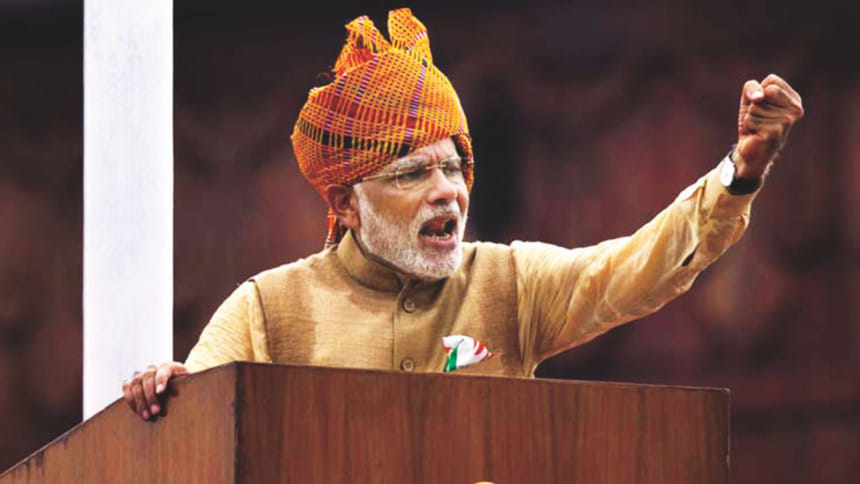Whither Start-Up India?

Nearing completion of two years in office, Indian Prime Minister Narendra Modi recently launched yet another of his pet projects for job-creation and perking up the economy—the Start-Up India. The project is aimed at attracting investments and young entrepreneurs to technology and e-commerce start-ups to expedite the pace of employment-generation at a time when the big conventional manufacturing sector in India has slowed down and the employment-growth in government and the traditional brick-and-mortar economy has seen a slump. Experts have argued that the Start-Up India is timely because the world economic growth prospects are not encouraging because of the slackening of China's economy, the second largest in the world.
The Start-Up India campaign has been put in place with much fanfare with Modi himself announcing before a gathering of founders of some of the world's top start-up companies a slew of incentives for new start-up companies—a Rs 10,000-crore fund , tax exemption on capital gains if they invested in another start-up company, no income for first three years (in any case, few start-ups make profit in first three years) tax and government inspection for a new start-up for three years, self-certification for compliance of labour and environment laws, Rs 2000-crore credit guarantee scheme, 80 per cent reduction in patent fee and allowing start-ups in government purchase.
The announcement of the SOPs (Standard Operating Procedure) by Modi came almost five months after he had announced the proposal to launch Start-Up India in his Independence Day speech in August last year. The timing could not have been better because many Indian start-up firms have begun moving out of the country largely due to policy and tax issues in search of greener pastures abroad for more favourable climate of doing business.
At present, India is the world's third largest start-up destination after the United States and Britain. However, the exodus of Indian start-ups to other countries is ironical given the fact that global start-up giants like Facebook, Twitter, Amazon, WhatsApp and Uber, the internet-based taxi service provider, have established their presence in India. India undoubtedly, constitutes a huge market for start-ups, irrespective of whether they are registered in India or abroad, and most of the technology-driven start-ups are eyeing the mobile internet in India where people using cell phones/internet is soon expected to surpass the total population of the United States. It certainly does not mean that Indian start-ups are not aware of the attraction of the size of the Indian market. So, it now remains to be seen if the government project for start-ups, centering around tax breaks and removal of some regulatory hurdles, can create an environment conducive enough for the Indian companies registered abroad to return home. Industry sources say many venture capital companies are waiting to study the fine print of the government's blueprint for start-ups before making a decision to put money in India.
Whether or not one has got the precise definition of a start-up company at the launch of the Start-Up India project, an important issue was Modi's attempt to spell out the start-ups which can look forward to the incentives announced by the Prime Minister. Firms established in the last five years with an annual turnover of below Rs 25 crore working "towards innovation, development, deployment or commercialisation of new products, processes or services driven by technology or intellectual property," fall in this category. Whether a start-up meets these conditions has to be certified by an inter-ministerial board. Critics, however, say this is just yet another regulatory hurdle. But the question is: start-ups, or any industry for that matter, cannot just have an unfettered life without any oversight and control. The key question—and perennial debate—is of oversight and control.
Economic liberalisation notwithstanding, enterpreneurs believe India still remains a tough place to do business, navigating through the bureaucratic maze, and taxation and regulatory laws to start and wind up a business. It is often alleged that it is easier to start a business in India than to shut it down. At the Start-Up India launch, Modi signalled his government's willingness to address this concern by passing the Bankruptcy Law possibly in the coming budget session of parliament. Start-up companies want to be allowed to shut down quickly if they do not find ventures profitable in India. A major question here is: do start-up companies want to become fly-by-night operators, leaving the employees in the lurch? Can the government allow start-ups to turn into fly-by-night operators? There is also concern that start-ups, which by and large are highly risk-prone, should not turn into another bubble like dotcoms.
It has also been suggested that government funds for start-ups be directed towards those investing in sectors like food-processing and not in internet-driven companies or e-commerce firms, which are anyway attracting funds from overseas. It is all very well to talk of deregulation and less governmental interference in private businesses but the question is: should a free-for-all situation be created in the name of free enterprise?
It has also been recommended that India needs good infrastructure like steady power supply, good roads and the internet facilities in its hinterlands to help achieve the government's plan to create 30,000 start-ups.
The incentives rolled out for the start-up sector have raised much bigger questions. Should the government announce sector-specific goodies or go for omnibus measures, easing regulatory hurdles in the form of outdated laws and bureaucratic tape across the industry and business spectrum in general? Moreover, are incentives not a throw-back to a bygone era when government used to handhold the industry by shielding it from market forces competition and expecting it to thrive?
The writer is New Delhi correspondent of The Daily Star.

 For all latest news, follow The Daily Star's Google News channel.
For all latest news, follow The Daily Star's Google News channel. 




Comments